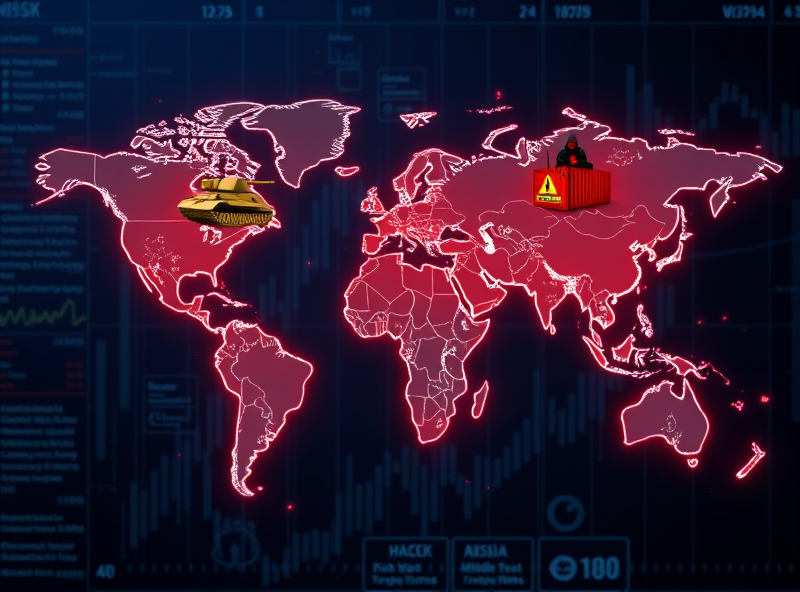
How Geopolitical Risks Affect Stock Market Volatility

Hey there, savvy investors! 🌍 Ready to master one of the most challenging yet rewarding aspects of investing? Today, we’re diving deep into geopolitical risk investing – the art of understanding how world events impact your portfolio and, more importantly, how to profit from this knowledge.
Whether you’re watching the news about international tensions or wondering why your stocks just took a nosedive after some overseas conflict, this comprehensive guide will transform you from a reactive investor into a strategic player who can navigate global uncertainty with confidence. Let’s turn world events into investment opportunities!
Understanding Geopolitical Risks: The Forces That Shape Your Portfolio
Geopolitical risks aren’t just headlines – they’re powerful market-moving forces that can make or break your investment returns. These events stem from political, economic, or military actions between countries, and smart investors learn to read these signals like a roadmap to profit opportunities.
Think of geopolitical events as the weather system of the financial world. Just as meteorologists track storm patterns to predict weather changes, successful investors monitor global tensions to anticipate market movements. The key difference? While you can’t control the weather, you can absolutely control how you position your portfolio to benefit from geopolitical shifts.
The Five Major Categories of Geopolitical Risk
Understanding these categories is like having a GPS for navigating market volatility. Each type creates different opportunities and challenges for your investment strategy.
Military Conflicts: The Ultimate Market Disruptors
Military conflicts represent the most dramatic form of geopolitical risk, often triggering immediate and significant market reactions. But here’s what most investors miss: conflicts create both risks AND opportunities for those who know how to position themselves correctly.
Recent Examples and Market Impact
The Russia-Ukraine Conflict: This ongoing situation perfectly illustrates how military conflicts reshape investment landscapes:
- Energy Sector Boom: Oil and gas stocks surged as supply concerns dominated markets
- Defense Contractor Rally: Lockheed Martin, Raytheon, and Boeing saw significant gains
- Agricultural Disruption: Wheat and fertilizer prices skyrocketed, benefiting agribusiness stocks
- European Market Volatility: DAX and FTSE indices experienced sharp initial declines
Investment Opportunity: Smart investors who recognized the energy supply implications early saw returns of 50%+ in energy sector ETFs during the first six months of the conflict.
Strategic Positioning for Military Conflicts
Immediate Beneficiaries:
- Defense Contractors: Increased government spending on military equipment
- Energy Companies: Supply disruptions often lead to higher prices
- Cybersecurity Firms: Modern conflicts drive demand for digital defense
- Commodity Producers: Essential materials become more valuable during conflicts
Safe Haven Assets:
- Gold and Precious Metals: Traditional store of value during uncertainty
- U.S. Treasury Bonds: Flight to quality drives demand
- Swiss Franc and Japanese Yen: Historically stable currencies
- Utility Stocks: Essential services maintain demand regardless of conflicts
Political Instability: The Hidden Portfolio Killer
Political instability might seem less dramatic than military conflicts, but it can be equally destructive to unprepared portfolios. However, it also creates some of the best contrarian investment opportunities for those brave enough to act when others are fleeing.
Types of Political Instability and Investment Implications
Government Collapses and Coups:
- Immediate Impact: Sharp currency devaluation and capital flight
- Recovery Opportunity: Oversold quality companies often provide excellent entry points
- Sector Impact: Infrastructure and telecommunications stocks often become undervalued
Contested Elections:
- Pre-Election Volatility: Markets hate uncertainty, creating trading opportunities
- Policy Implications: Different outcomes favor different sectors
- Currency Effects: Election results can dramatically impact exchange rates
Civil Unrest and Protests:
- Short-Term Disruption: Temporary business interruptions
- Long-Term Opportunities: Social movements often drive policy changes that benefit certain sectors
Profiting from Political Instability
The Contrarian Approach: When political instability strikes, most investors panic and sell. This creates opportunities for patient investors to buy quality assets at discount prices.
Successful Strategy Example: During the 2016 Brexit vote, the British pound plummeted and UK stocks crashed. Investors who bought quality UK companies at the bottom saw gains of 30-50% over the following two years as markets stabilized.
Trade Wars and Economic Sanctions: The Modern Battlefield
Trade conflicts represent perhaps the most complex form of geopolitical risk because they create both winners and losers across multiple sectors and regions. Understanding these dynamics can lead to some of the most profitable investment strategies.
The U.S.-China Trade War: A Masterclass in Geopolitical Investing
The 2018-2020 U.S.-China trade tensions created a perfect laboratory for studying how trade conflicts impact markets:
Losers:
- Technology Companies: Supply chain disruptions hit tech stocks hard
- Agricultural Exporters: Retaliatory tariffs devastated soybean and corn producers
- Manufacturing: Companies with Chinese operations faced margin pressure
Winners:
- Domestic Producers: U.S. steel companies benefited from tariff protection
- Alternative Suppliers: Vietnamese and Mexican manufacturers gained market share
- Logistics Companies: Reshoring trends boosted domestic shipping and warehousing
Investment Strategies for Trade Conflicts
Supply Chain Analysis:
- Identify companies that benefit from supply chain reshoring
- Look for alternative suppliers in non-affected countries
- Consider logistics and infrastructure plays
Currency Hedging:
- Trade wars often impact currency values
- Consider currency-hedged ETFs for international exposure
- Monitor central bank responses to trade tensions
Sector Rotation:
- Shift from globally integrated companies to domestic-focused ones
- Look for import substitution opportunities
- Consider infrastructure plays that benefit from reshoring
Terrorism and Cybersecurity Threats: The Digital Age Risks
Modern geopolitical risks increasingly include cyber warfare and terrorism, creating new categories of investment opportunities that didn’t exist a generation ago.
The Cybersecurity Investment Boom
Growing Market: The global cybersecurity market is expected to reach $345 billion by 2026, driven by increasing geopolitical tensions and digital warfare.
Key Investment Themes:
- Government Contracts: Companies providing security to federal agencies
- Critical Infrastructure Protection: Power grid, water system, and transportation security
- Financial Services Security: Banking and payment system protection
- Cloud Security: As businesses move online, cloud protection becomes essential
Top Cybersecurity Stocks to Watch:
- CrowdStrike (CRWD): Leading endpoint protection
- Palo Alto Networks (PANW): Comprehensive security platform
- Fortinet (FTNT): Network security leader
- Zscaler (ZS): Cloud security pioneer
Terrorism Impact on Specific Sectors
Aviation and Travel:
- Short-term disruption followed by enhanced security spending
- Opportunities in security technology and screening equipment
- Long-term shifts in travel patterns create regional winners and losers
Insurance:
- Increased demand for terrorism and cyber insurance
- Specialty insurers often benefit from higher premiums
- Reinsurance companies adapt pricing models
Diplomatic Tensions: The Slow-Burn Investment Opportunity
Diplomatic tensions might not grab headlines like military conflicts, but they create sustained investment themes that can generate profits for years.
U.S.-Iran Relations: A Case Study in Diplomatic Risk
The ongoing tensions between the U.S. and Iran illustrate how diplomatic relationships impact specific sectors:
Oil Markets:
- Sanctions reduce Iranian oil supply
- Other producers benefit from higher prices
- Oil service companies gain from increased drilling activity
Regional Power Dynamics:
- Saudi Arabia and UAE benefit from reduced Iranian influence
- Israeli defense contractors gain from shared security concerns
- European companies face compliance challenges with sanctions
Investment Strategies for Diplomatic Tensions
Energy Sector Plays:
- Focus on producers outside sanctioned regions
- Consider renewable energy as countries seek energy independence
- Look for oil service companies in permitted regions
Defense and Security:
- Regional defense contractors benefit from arms sales
- Intelligence and surveillance companies gain from heightened security needs
- Cyber defense becomes increasingly important
How Markets React: Decoding the Patterns for Profit
Understanding market psychology during geopolitical events is crucial for successful investing. Markets often follow predictable patterns that create opportunities for prepared investors.
The Typical Market Response Cycle
Phase 1: Initial Shock (0-72 hours)
- Sharp sell-offs across risk assets
- Flight to safe haven assets (gold, treasuries, yen)
- Volatility spikes dramatically
- Opportunity: Quality stocks often oversold
Phase 2: Assessment Period (3 days – 2 weeks)
- Markets begin to differentiate between winners and losers
- Sector rotation becomes apparent
- Volatility remains elevated but begins to decline
- Opportunity: Sector-specific plays become clearer
Phase 3: Adaptation (2 weeks – 3 months)
- Markets adapt to new reality
- Long-term implications become clearer
- Volatility normalizes
- Opportunity: Position for long-term themes
Phase 4: New Normal (3+ months)
- Markets fully price in geopolitical changes
- New investment themes emerge
- Volatility returns to normal levels
- Opportunity: Next geopolitical risk preparation
Sector-Specific Reaction Patterns
Immediate Beneficiaries:
- Gold and Precious Metals: +5-15% in first week
- Defense Stocks: +10-25% over first month
- Energy Stocks: Varies by conflict type, often +20-50%
- Safe Haven Currencies: Yen and Swiss Franc strengthen
Immediate Losers:
- Airlines and Travel: -10-30% initially
- Emerging Market Stocks: -15-25% in affected regions
- High-Beta Growth Stocks: -20-40% during volatility spike
- Cyclical Stocks: -15-30% on economic uncertainty
Real-World Case Studies: Learning from History’s Lessons
Let’s examine specific historical events to understand how successful investors navigated geopolitical risks and generated substantial returns.
Case Study 1: Gulf War (1991) – The Energy Play
The Setup: Iraq’s invasion of Kuwait created oil supply concerns and military intervention possibilities.
Market Reaction:
- Oil prices doubled from $20 to $40 per barrel
- S&P 500 fell 15% in initial months
- Defense stocks surged 25-40%
Winning Strategy: Investors who bought oil stocks and defense contractors in August 1990 saw returns of 50-100% by war’s end in February 1991.
Key Lesson: Supply disruption fears often create more opportunity than actual supply disruptions.
Case Study 2: 9/11 Attacks (2001) – The Security Revolution
The Setup: Terrorist attacks fundamentally changed security priorities across multiple sectors.
Market Reaction:
- Stock market closed for 4 days (longest since 1933)
- S&P 500 fell 11.6% in first week of trading
- Airlines lost 40% of value in days
Winning Strategy:
- Short-term: Buying quality stocks during the panic selling
- Long-term: Investing in homeland security and defense technology companies
Key Lesson: Paradigm-shifting events create new investment themes that can last decades.
Case Study 3: Brexit Vote (2016) – The Currency Opportunity
The Setup: UK vote to leave European Union created massive uncertainty about economic relationships.
Market Reaction:
- British pound fell 10% overnight
- UK stocks (FTSE 100) initially fell 8%
- European stocks declined 7-12%
Winning Strategy: Currency traders who shorted the pound made fortunes, while equity investors who bought quality UK companies at the bottom saw strong returns as markets recovered.
Key Lesson: Referendum and election outcomes create short-term overreactions that can be profitably exploited.
Case Study 4: COVID-19 Pandemic (2020) – The Black Swan
The Setup: Global pandemic created unprecedented economic disruption and geopolitical tensions.
Market Reaction:
- S&P 500 fell 34% in 5 weeks (fastest bear market in history)
- Oil prices briefly went negative
- Technology stocks eventually soared on digital transformation
Winning Strategy:
- Technology: Companies enabling remote work saw 100-300% gains
- Healthcare: Vaccine and treatment developers provided massive returns
- E-commerce: Accelerated adoption benefited online retailers
Key Lesson: Black swan events create both massive disruption and transformational opportunities.
Advanced Investment Strategies for Geopolitical Risk
Now that you understand how geopolitical events unfold, let’s explore sophisticated strategies that professional investors use to profit from global uncertainty.
Strategy 1: The Geopolitical Hedge Portfolio
Create a permanent allocation (5-15% of portfolio) to assets that typically benefit from geopolitical tensions:
Core Holdings:
- Gold ETF (GLD): 3-5% allocation
- Defense ETF (ITA): 2-3% allocation
- Energy ETF (XLE): 3-5% allocation
- Cybersecurity ETF (HACK): 2-3% allocation
Benefits: This allocation provides downside protection during crises while participating in upside during calm periods.
Strategy 2: The Crisis Alpha Approach
Maintain cash reserves (10-20% of portfolio) specifically for deploying during geopolitical crises:
Deployment Triggers:
- VIX spikes above 30
- S&P 500 falls 10% or more in a week
- Major geopolitical event occurs
Target Investments:
- Quality dividend stocks at discount prices
- Sector ETFs in affected but fundamentally sound industries
- Individual companies with strong balance sheets trading below intrinsic value
Strategy 3: The Global Macro Rotation
Systematically rotate between regions and sectors based on geopolitical developments:
Regional Rotation:
- U.S. Focus: During global uncertainty (safe haven effect)
- Emerging Markets: During stable periods (higher growth potential)
- European Focus: During U.S.-specific risks
- Asian Focus: During Western tensions
Sector Rotation:
- Defensive Sectors: During rising tensions
- Cyclical Sectors: During resolution/de-escalation
- Growth Sectors: During stable periods
Strategy 4: The Volatility Harvesting Method
Use options strategies to generate income from elevated volatility during geopolitical events:
Covered Call Strategy:
- Own defensive stocks (utilities, consumer staples)
- Sell call options during high volatility periods
- Generate additional income while maintaining downside protection
Cash-Secured Puts:
- Sell put options on stocks you want to own
- Collect premium during volatile periods
- Acquire stocks at desired prices if assigned
Building Your Geopolitical Risk Management System
Creating a systematic approach to geopolitical investing requires both proactive monitoring and reactive positioning strategies.
Information Sources and Monitoring Tools
Essential News Sources:
- Financial Times: Excellent geopolitical analysis
- The Economist: Long-term perspective on global trends
- Foreign Affairs: Academic analysis of international relations
- Bloomberg Terminal: Real-time market reactions to events
Early Warning Indicators:
- VIX (Volatility Index): Spikes often precede major events
- Currency Movements: Flight to safety currencies strengthen
- Commodity Prices: Gold and oil often move before news breaks
- Bond Spreads: Credit spreads widen before major disruptions
Monitoring Dashboard Creation:
- Set up Google Alerts for key geopolitical terms
- Create Twitter lists following geopolitical analysts
- Use Economic Calendars to track policy announcements
- Monitor Satellite Data services for early conflict indicators
Risk Assessment Framework
Event Classification System:
Level 1 – Minor Tensions:
- Diplomatic protests or minor trade disputes
- Limited market impact expected
- Action: Monitor but maintain current allocation
Level 2 – Moderate Escalation:
- Sanctions, trade barriers, or regional conflicts
- Sector-specific impacts likely
- Action: Implement sector rotation strategies
Level 3 – Major Crisis:
- Military conflicts, major elections, or economic warfare
- Broad market impact expected
- Action: Activate crisis alpha strategies
Level 4 – Black Swan Event:
- Unprecedented events with unknown consequences
- Severe market disruption likely
- Action: Full defensive positioning
Portfolio Construction Guidelines
Diversification Requirements:
- Geographic: No more than 50% in any single country
- Sector: Maximum 20% in any single sector
- Currency: Consider currency hedging for international exposure
- Time Horizon: Mix of short-term tactical and long-term strategic positions
Risk Management Rules:
- Stop Losses: Set at 15-20% for individual positions
- Position Sizing: No single geopolitical bet exceeds 5% of portfolio
- Correlation Monitoring: Avoid concentrated exposure to similar risks
- Liquidity Management: Maintain ability to quickly adjust positions
Advanced Geopolitical Investment Themes for 2024 and Beyond
Understanding current and emerging geopolitical trends can help you position for the next wave of investment opportunities.
Theme 1: The New Cold War – U.S. vs. China
Investment Implications:
- Supply Chain Reshoring: Benefiting domestic manufacturing
- Technology Decoupling: Creating opportunities in semiconductor and tech sectors
- Military Modernization: Driving defense spending increases
- Energy Independence: Accelerating renewable energy adoption
Key Stocks and ETFs:
- ROBO ETF: Automation and robotics for reshoring
- JETS ETF: Aerospace and defense exposure
- ICLN ETF: Clean energy theme play
- FXI ETF: China exposure for contrarian opportunities
Theme 2: Resource Nationalism and Supply Security
Investment Implications:
- Critical Minerals: Lithium, rare earths, and strategic metals
- Food Security: Agricultural technology and vertical farming
- Water Scarcity: Water treatment and management technologies
- Energy Storage: Battery technology and grid storage solutions
Key Investment Areas:
- Lithium Miners: LAC, ALB, SQM
- Agricultural Technology: CTVA, ADM, DE
- Water Technology: XYL, AWK, WMS
- Battery Technology: TSLA, CATL, QS
Theme 3: Cyber Warfare and Digital Sovereignty
Investment Implications:
- Cybersecurity: Exponential growth in security spending
- Cloud Infrastructure: Need for sovereign cloud solutions
- Quantum Computing: Next-generation encryption and computing
- Digital Identity: Secure authentication technologies
Key Investment Opportunities:
- Cybersecurity Leaders: CRWD, PANW, FTNT
- Cloud Infrastructure: AMZN, MSFT, GOOGL
- Quantum Computing: IBM, GOOGL, IonQ
- Digital Identity: OKTA, PING, CyberArk
Your Action Plan for Geopolitical Investment Success
Ready to implement these strategies? Here’s your step-by-step roadmap to becoming a successful geopolitical investor.
Phase 1: Foundation Building (Weeks 1-4)
Week 1: Education and Setup
- Read 2-3 geopolitical analysis pieces daily
- Set up news alerts for major geopolitical terms
- Create monitoring dashboard for key indicators
- Open accounts with brokers offering international ETFs
Week 2: Portfolio Assessment
- Analyze current portfolio for geopolitical exposures
- Identify concentration risks in specific regions/sectors
- Calculate correlation between holdings during past crises
- Determine appropriate hedge allocation percentage
Week 3: Initial Implementation
- Establish core hedge positions (gold, defense, energy)
- Set up cash reserve for crisis opportunities
- Begin tracking volatility indicators (VIX, currency movements)
- Create watchlists for crisis-opportunity stocks
Week 4: System Testing
- Practice with small position sizes
- Test information flow and decision-making process
- Refine monitoring tools and alerts
- Document lessons learned from initial trades
Phase 2: Active Implementation (Months 2-3)
Month 2: Strategy Development
- Implement chosen primary strategy (hedge, crisis alpha, or rotation)
- Begin regular portfolio rebalancing based on geopolitical developments
- Start using options strategies for volatility harvesting
- Develop sector rotation models
Month 3: Advanced Techniques
- Add international currency exposure considerations
- Implement more sophisticated hedging strategies
- Begin using derivatives for risk management
- Develop contrarian investment criteria
Phase 3: Mastery and Optimization (Months 4-12)
Ongoing Development:
- Continuously refine risk assessment framework
- Develop proprietary indicators for early warning
- Build network of information sources and analysts
- Create systematic approach to position sizing
Performance Tracking:
- Measure returns during different geopolitical environments
- Track accuracy of geopolitical event predictions
- Optimize allocation percentages based on results
- Document and learn from both successful and unsuccessful trades
Conclusion: Your Geopolitical Investment Journey Starts Now
Congratulations! You now possess the knowledge and tools to transform geopolitical uncertainty from a source of anxiety into a driver of investment returns. Remember, while other investors panic during global crises, you’ll be positioned to profit from their fear.
The key to successful geopolitical investing isn’t predicting exactly what will happen – it’s being prepared for multiple scenarios and having the discipline to execute your strategies when opportunities arise. By understanding how different types of geopolitical events impact markets, you can position yourself to benefit regardless of which specific risks materialize.
Your Key Success Principles:
- Stay Informed: Knowledge is your competitive advantage
- Remain Disciplined: Stick to your system even during emotional market periods
- Think Contrarian: The biggest opportunities often come when others are most fearful
- Diversify Smartly: Don’t just diversify by sector – diversify by geopolitical risk
- Maintain Liquidity: Keep powder dry for crisis opportunities
- Plan for Multiple Scenarios: The unexpected is the only certainty in geopolitics
The world is becoming increasingly interconnected yet simultaneously more fragmented. This paradox creates both new risks and new opportunities for savvy investors. By mastering geopolitical risk investing, you’re not just protecting your wealth – you’re positioning yourself to benefit from the very forces that frighten other investors.
Your journey to geopolitical investment mastery starts today. The next global crisis is an opportunity waiting to happen – will you be ready to seize it?
Remember, geopolitical investing involves significant risks and requires careful consideration of your personal financial situation, risk tolerance, and investment objectives. Past performance doesn’t guarantee future results. Consider consulting with qualified investment professionals before implementing these strategies.







